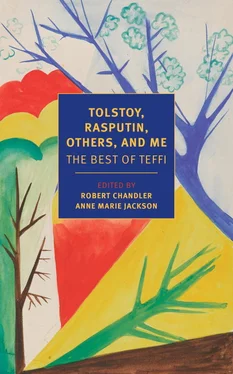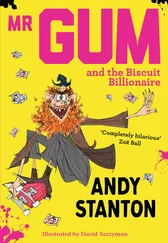“Nonsense!” interrupted Merezhkovsky. “Absolute nonsense! No one loves. No one is loved.”
There was something desperate behind this. These were not idle words. Merezhkovsky’s whole face had darkened. Dear God! What torments this man must have been going through in the black pit he inhabited… I felt fear for him, and pain.
“Dmitry Sergeyevich! What makes you say that? It’s just that you don’t see people. You don’t really notice them.”
“Nonsense. I do notice people.”
I may be wrong, but in his words I had heard both longing and despair. I thought of his most recent poem, “O Loneliness, O Poverty”. And I thought of Gogol’s Khoma Brut. The dead sorceress’s coffin flying just above his head. It was terrifying.
“Dmitry Sergeyevich! You truly don’t notice people. I know I’m always laughing at you, but really I love you.”
It was as if, with these words, I were making the sign of the cross over myself.
For a moment he seemed at a loss; then he recovered himself: “I think it’s my works you love—not me.”
“No, Dmitry Sergeyevich, I love you, as a human being.”
He was silent for a moment. Then he turned and went slowly to his room. He came back and handed me a photograph of himself, with an affectionate inscription.
I have this photograph still.
1950 Translated by Anne Marie Jackson
I did not see Repin often. He lived in Finland and came only seldom to Petersburg.
But one day Kaplan, from the publishing house “Dog Rose”, [1] In 1910 this publishing house (Shipovnik) had published Teffi’s first two books—a collection of poems and a collection of stories.
came round with a letter from Repin. Repin very much liked my story “The Top”. [2] First published in December 1915—a story about an exceptionally fatuous man whose repeated expressions of wonder at life’s everyday miracles bore and exasperate not only his wife but also his small children.
“It moved me to tears,” he wrote. And this had made him want to paint my portrait.
This, of course, was a great honour for me. We agreed on a date and time, and Kaplan took me along in his car.
It was winter. Cold. Snowstorms. All very miserable. With its squat dachas deep in snow, Kuokkala was not welcoming. The sky was also very low, even darker than the earth and breathing out cold. After Petersburg, with its loud voices, with its whistles and car horns, the village seemed very quiet. The snow lay in deep drifts and there could have been a bear beneath every one of them, fast asleep, sucking its paw.
Repin greeted us warmly. He took us into his studio and showed us his latest work. Then we sat down for a late breakfast at his famous round table. The table had two levels. On the top level, which revolved, were all kinds of dishes; you moved it round and helped yourself to whatever you fancied. On the lower level were containers for the dirty plates and bowls. It was all very convenient, and fun—like having a picnic. The food was vegetarian, and there was a lot of variety. Some of our more serious eaters, though, would complain after a visit that they’d been given nothing but hay. In the railway station on the way back home, they’d go to the buffet and fill up on meat rissoles, which would by then have grown cold.
After breakfast—work.
Repin seated me on a little dais and then sat down below me. He was looking up at me, which seemed very strange. I’ve sat for a number of artists—Alexandr Yakovlev, Savely Sorin, Boris Grigoryev, Savely Schleifer [3] All four artists emigrated after the Revolution. Teffi’s Memories includes a brief mention of Schleifer and longer mentions of Yakovlev. The whereabouts of these portraits are unknown; probably they have not survived.
and many who are less well known—but no one has ever gone about it so strangely.
He was using coloured pencils, which he didn’t do often. “It’ll be Paris style,” he said with a smile.
He asked someone else who was there to read aloud “The Top”, the story of mine that had made such an impression on him. This made me think of Boris Kustodiev’s account of how, while he was painting his portrait of Nicholas II, the Tsar had read aloud one of my stories of village life. He had read well—and then he had asked if it was really true that the author was a lady.
Repin’s finished portrait of me was something magically tender, unexpected, not at all like his usual, more forceful work.
He promised to give it to me. But I never received it. It was sent to an exhibition in America and, in Repin’s words, “it got stuck in customs”.
I didn’t like to question him too insistently. “He simply doesn’t want to admit that he sold it,” people kept telling me.
It would, in any case, have disappeared during the Revolution, as did all the other portraits of me, as did many beloved things without which I’d thought life would be hardly worth living.
Years later, in Paris, I republished “The Top” in The Book of June , dedicating the story to Repin. I sent a copy of the book to the address I still had for him in Finland. He replied warmly, asking me to send him a few amateur photographs, just as they were, without any retouching. With these to prompt him, he’d be able to recreate the portrait from memory. At the bottom of the letter was a postscript from his daughter, saying that her father was very weak, hardly able to move about at all.
I was touched by this thoughtfulness on Repin’s part, but I was slow to do as he asked. Eventually, however, I did—only to read in a newspaper, the very next day, that Repin had died.
I shall remember this short, rather thin man as someone uncommonly polite and courteous. His manner was always unruffled and he never showed the least sign of irritation. In short: “A man from another age”.
I’ve heard it said that, after pointing out the failings in a work by one of his weaker students, he would add, “Oh, if only I had your brush!”
Even if he didn’t really say this, it’s easy to imagine him coming out with something similar. Repin was modest. People accustomed to praise and flattery usually speak a lot and don’t listen. Speak—rather than converse. Fyodor Chaliapin, Vlas Doroshevich and Leonid Andreyev all strode about the room and held forth. Repin would listen intently to the other person. He conversed.
His wife Natalya Nordman-Severova was a committed vegetarian. She converted her husband. The revolving table was her idea too. When, overcome by jealousy, she left her husband, he remained loyal to vegetarianism. But shortly before his death, growing weaker and weaker, he ate a little curd cheese. This lifted his spirits. Then he decided to eat an egg. And that gave him the strength to get to his feet and even to do some work. [4] Teffi seems unaware of any distinction between vegetarianism and veganism—a distinction perhaps seldom made at this time.
His last note to me read, “I’m waiting for your photos. I’m determined to do your portrait.”
His handwriting was weak. He was not strong enough to paint a portrait.
Not that I had ever really expected anything to come of all this. I’ve never been a collector, never been able to keep hold of things and not let them slip through my hands. When I’ve been asked by fortune tellers to spread out my palms, they always say, with a shake of the head, “No, with hands like that you’ll never be able to hold on to anything.”
•
There was also a portrait of me by Savely Schleifer. It too had its story. [5] Teffi also tells this story in chapter 2 of Memories ; some details differ.
Читать дальше












